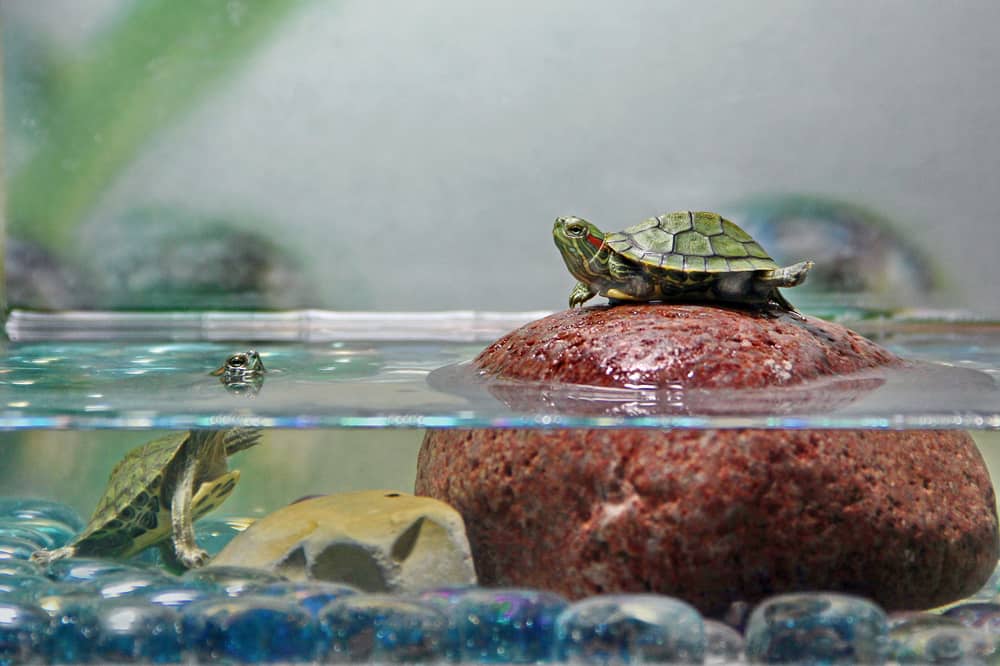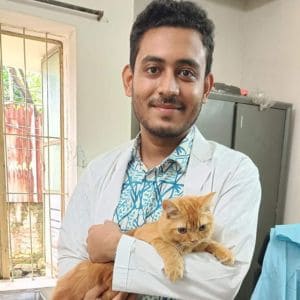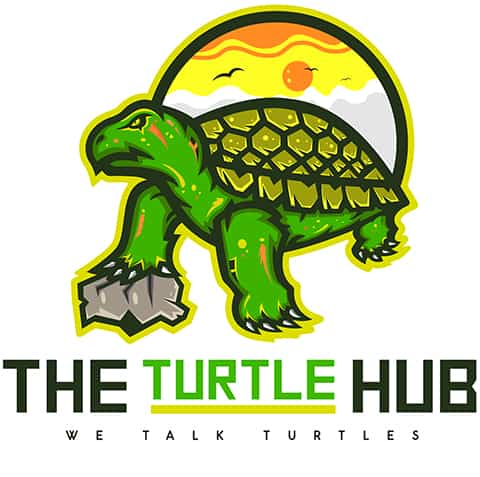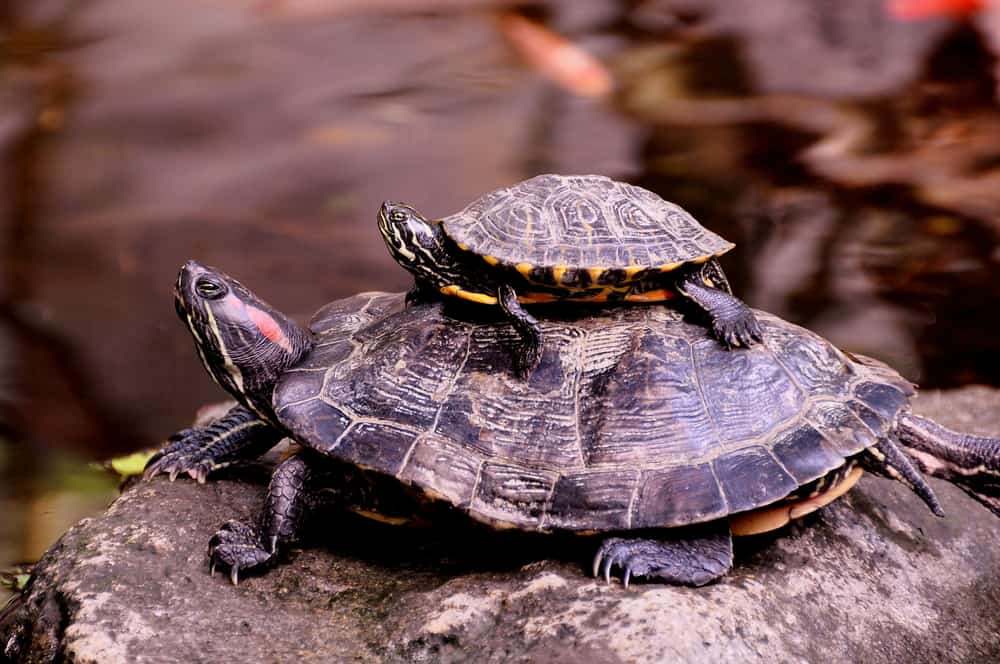Tags:
Why Do Turtles Eat Their Babies? [Is It Natural?]


fact checked & review by
Dr. Partho Kumar Shaha
Veterinarian (DVM)
The information is current and up-to-date in accordance with the latest veterinarian research.
When I first started keeping turtles, my peers advised me to separate the newborns from the adult ones. Later, I discovered that adult turtles have a habit of injuring or killing baby turtles. Sometimes, parent turtles can eat their babies as well.
But why do turtles eat their babies or hurt them?
Turtles can eat their babies if stressed out and consider the baby turtles as potential threats. If some of the baby turtles are weaker than others or if the mother turtle detects any sickness in any of the baby turtles, it can kill and eat that specific offspring to protect the others.
However, it’s not common for turtles to eat their babies. But since dire circumstances can lead adult turtles to prey on the babies, raising them separately is recommended.
read all our guides on baby turtle feeding!
Key Takeaways
- Turtles don’t possess enhanced maternal instincts.
- Mother turtles leave their eggs behind and don’t return to raise the offspring.
- Aggresive adult turtles can kill and eat baby turtles.
- Snapping, painted turtles, and red-eared sliders tend to be aggressive toward baby turtles.
- Mother turtles can kill diseased baby turtles to protect the healthy baby turtles.
- Baby turtles can spread diseases like salmonella.
Do Turtles Eat Their Own Eggs?
Some turtles eat their eggs under unreliable captivity conditions.
- Lack of protein sources in the provided diet
- Failure to separate the eggs and adult turtles
The aforementioned reasons can heavily influence turtles to eat their eggs. If the turtles aren’t getting enough protein, they can smash the egg shells prematurely to gain some much-needed protein from the eggs.
Again, some aggressive turtles feed on reptile eggs in the wild alongside fish eggs, mosquito larvae, tadpoles, etc.
If such an aggressive species is present in the tank, they’ll mercilessly go after the eggs regardless of protein availability in their diets. Generally, painted turtles, red-eared sliders & snapping turtles display such aggression.
Read More: What Do Baby Turtles Eat In The Wild?
4 Reasons Why Turtles May Eat Their Babies
Turtles don’t naturally eat their alive and healthy babies. But if they do, here are four likely reasons behind such behavior –
1. Extreme Stress Or Duress In Parent Turtles
Turtles exhaust all their strength while laying eggs. Sea turtles even traverse hundreds of miles to safely leave their eggs on the beaches. So, in nature, turtles rarely stick around to raise the offspring after they hatch.
More often than not, they leave after laying eggs, and the baby turtles rarely get to meet the parent turtles in the wild. However, turtles may have to stick around in captivity if the owners don’t separate the eggs in time. If this happens, turtles can feel stressed out.
The excess stress can cause the turtles to get rid of any unwanted entries in the tank as they don’t feel safe anymore.
Mother turtles can even fail to recognize their own offspring as they haven’t had the time to get acquainted yet. Hence, as the baby turtles are feeble strangers inside the tank, parent turtles will eliminate the threats by killing them.
Read More: Do Crabs Eat Baby Turtles?
2. Presence Of Stillborn Babies
If there are stillborn babies in the eggs, mother turtles can kill and eat them without remorse. Not just turtles, many other animals, such as cats, dogs, rats, etc., also eat their babies if they realize that some specific babies won’t make it anyway.
Although mother turtles don’t feed or raise their babies in the traditional sense, they can still protect the eggs or hatchlings from predators in the wild.
While guarding, if they detect the presence of stillborn babies, they’ll eat them and continue to protect the healthy ones from predators.
3. If The Newborns Are Diseased
Baby turtles are responsible for spreading salmonella if they already carry the disease. If these diseased newborns are kept in the tank undetected, they can infect all the species, including humans who touch them.
Mother turtles can detect the presence of such sickness in baby turtles sometimes. So, if any of the newborns come out diseased, the mother will kill and eat them to protect the healthy offspring from the sickness.
4. Unfavourable Environmental Conditions
Mother turtles can feel extremely hormonal, and the slightest changes in the tank conditions can set them off. Some unfavorable environmental conditions for mother turtles include –
- the food isn’t to their liking
- the water temperature is off by a few degrees
- too much brightness or darkness in the tank, etc.
If baby turtles are kept near parent turtles during this post-birth hormonal phase, they can succumb to extreme duress and kill baby turtles.
How To Keep Newborn Turtles Safe In Captivity?
It’s not possible to revive the baby turtles after their parents have murdered them. So, here are a few tips to help you keep the newborn turtles safe in captivity –
Keep The Newborns In Separate Tanks
After the turtles lay eggs, try to keep the eggs in separate tanks. Or, you can keep the eggs with the other turtles if they don’t seem too hostile and use the time to set up a proper tank for the newborns.
Remember that even newborns need at least a 20-gallon tank to move around freely.
Hand-Feed The Weaker Offsprings
If some offspring lack mobility, you can use a small syringe to hand-feed them fluids to avoid weakness. On the contrary, healthy turtles need to hunt live things like earthworms, mealworms, etc., in captivity.
Read More: Can You Overfeed A Baby Turtle?
Separate The Diseased Baby Turtles
If any baby turtles seem diseased, separate them immediately before the virus spreads to the healthy ones. Watch out for blotchy shells, white spots, lesions on the necks, etc., after the baby turtles hatch. Contact the vet and arrange for proper medication as soon as possible.
Before You Go
Take it from my experience – the next time you decide to rescue some painted turtles, make sure there aren’t any adult turtles or other predators in the tank.
Turtles and other reptiles don’t have the same maternal instincts as humans or other mammals. So, separating the baby turtles from the beginning is best to avoid any casualties.
To explore the maternal instincts of turtles further, check out – How Do Mother Turtles Feed Their Babies?

About Author
Muntaseer Rahman started keeping pet turtles back in 2013. He also owns the largest Turtle & Tortoise Facebook community in Bangladesh. These days he is mostly active on Facebook.
Disclaimer
This site is owned and operated by Muntaseer Rahman. TheTurtleHub.com is a participant in the Amazon Services LLC Associates Program, an affiliate advertising program designed to provide a means for sites to earn advertising fees by advertising and linking to Amazon.com. This site also participates in other affiliate programs and is compensated for referring traffic and business to these companies.




